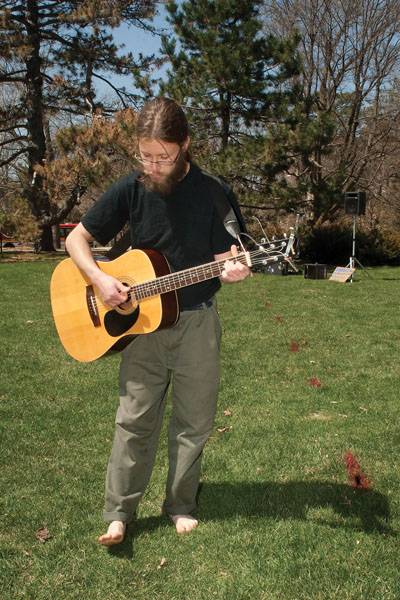Festivities celebrate Earth

Nate Logsdon, local musician and co-editor-in-chief of the Ames Progressive, plays to a crowd of earth-day festival attendees on central campus. Photo: Rashah McChesney/Iowa State Daily
April 22, 2009
The sun was shining, the grass was soft and clouds drifted lazily through the sky. It felt like spring. Fittingly, it was Earth Day and a number of ISU organizations banded together on Central Campus to tell everyone about the benefits of treating the earth well.
The festivities started off with a hitch. The tables were still being set up at 11:30 a.m. and both of the Nobel Prize-winning professors slated to speak were engaged in deep discussion underneath the campanile, near the microphone stands.
A large cutout of the earth had to be tied to a tree to keep it from blowing away, and there was a quick reshuffling of table arrangements as the students realized no one could reach their tables through the chain fences along the sidewalk.
About 10 minutes behind schedule, everything came together, and Gene Takle, the first speaker and professor of agronomy and geological and atmospheric sciences, took the microphone.
A group of about 10 people sat strewn around the grass as Takle spoke of the Kyoto Protocols and his recent trip to Denmark, where he said he attended a convention that had pre-discussions for a meeting in December, where renewing the protocols will be discussed. The protocols are set to expire in 2012.
“I have been involved in some international meetings recently that have underscored the importance of some of the decisions made in the next six to nine months,” he said. ”Global temperatures are already rising and we need to set a limit for the global mean temperatures. The carbon emission targets that emerge from this conference will influence policies on use of crops for food and fuel for decades.”
Takle said there has been a “systematic upward trend” in temperatures for the last 35 years.
“We go back and do attributions studies,” he said. “And what we found is that from the 1910s to the 1940s, there was a global rise in temperatures; then a period by 1975 where there is a brief cooling period; and then starting in about 1980, temperatures continue to rise.”
Takle explained that the studies showed that in the early part of the century, there was low volcanic activity worldwide and the sun was in an active phase. This meant the planet warmed due to activity that cannot necessarily be attributed to human activity.
This was followed, he said, by a period starting around 1975 where there was slightly above-average radiation from the sun in the atmosphere, but more active volcanos worldwide, which led to a cooling.
“So we know what it is that drives the global average temperature up. But now there’s no way that we can define why the temperatures went up if we leave out anthropogenic forces,” Takle said.
Anthropogenic, or human activities, he said, are things like using fossil fuels to provide power for the bulk of society.
“Eighty-five percent of our fuel supplies is based on fossil fuels, so that has to be reduced and reduced dramatically,” Takle said. “You will be living in a very different world by 2050.”
Takle said the world will be drastically different whether or not the human race decides to curb its emissions or not.
“If we don’t adopt better emissions standards, the environment will be a lot more hostile, and we are already seeing sensitive ecosystems being threatened,” he said.
Takle went on to say that the tools to change the world are available — the only thing missing is the political will to get the job done.
Applause signaled the end of Takle’s speech, and local musician Nate Logsdon, senior in English , played a mix of music.
Next, Bill Gutowski, professor in geological and atmospheric sciences, spoke about the earth and its natural cycles.
Gutowski emphasized the importance of realizing the choices made on one side of the planet affect the other.
“The oceans and the atmosphere link us to the rest of the planet whether we want it this way or not,” he said. “We are also linked in time. We are linked to the generations before us and the generations to come, and we have clearly affected the earth through our actions.”
Like Takle before him, Gutowski stressed the idea that there must be immediate changes in human behavior if the changes happening globally are to be counteracted.
“We have benefited from the economic development of our ancestors and our contributions are creating a gift to our descendants, a legacy. But we also have a responsibility to recognize the other outcomes of economic development that include global warming because they are also part of our legacy,” he said.
















